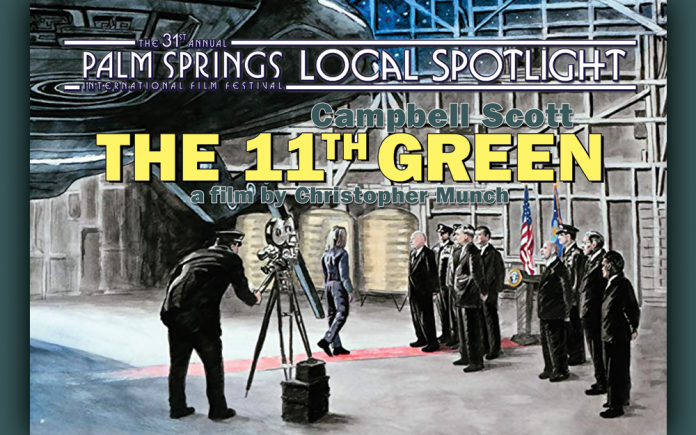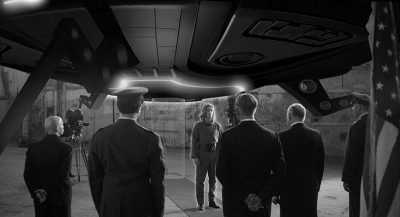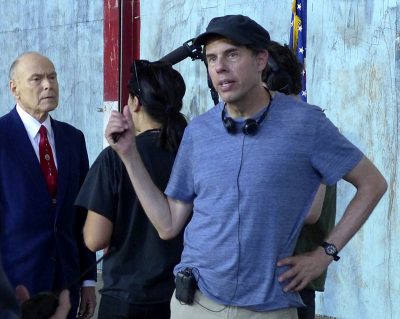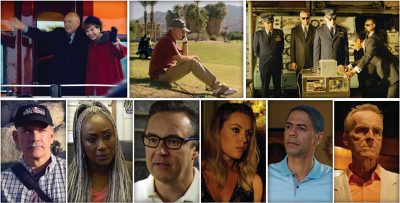
By Heidi Simmons
The Coachella Valley with its dark skies and wide-open spaces has had its share of unusual sightings and unexplained phenomenon. The questions: Are we alone in the universe, and do Unidentified Flying Objects really exist? are no longer considered “crazy talk.” Evidence exists that “something is going on.” But what do we really know?
Filmmaker Christopher Munch explores the big questions and exposes peculiar and unexplained incidents about alien/extraterrestrial activity in his film The 11th Green.
Shot almost entirely in the Coachella Valley, the story follows Jeremy (Campbell Scott) a journalist who, after his father dies, discovers long-buried footage purporting to document President Eisenhower’s alleged encounters with extraterrestrials.
CVW: How did you become interested in UFOs and the “alien visitation” subject matter?
 CM: UFOs and aliens were not subjects that I knew a lot about initially. Over the years, I had read some of the classic books: The Interrupted Journey by John Fuller, (which had deeply moved my mother in the ‘60s), the 1984 landmark Clear Intent by Fawcett and Greenwood, and a few books by Jacques Vallee and Allen Hynek.
CM: UFOs and aliens were not subjects that I knew a lot about initially. Over the years, I had read some of the classic books: The Interrupted Journey by John Fuller, (which had deeply moved my mother in the ‘60s), the 1984 landmark Clear Intent by Fawcett and Greenwood, and a few books by Jacques Vallee and Allen Hynek.
I had just spent six years trying to deal truthfully with another anomalous subject — that of sasquatch in Letters from the Big Man — and in 2013 I had made a short film for ITVS called Return to Elektra Springs, which dealt with an outcast inventor whose work in breakthrough propulsion had been suppressed.
That, more than anything probably, was my entry point into UFOlogy since there is an overlapping history of the suppression of information in both areas. And, I had delved into the free energy literature rather extensively.
My interest was not so much in UFOlogy per se, but rather in so-called exopolitics — the relationship of the nation-state to visitors from other worlds.
What fascinated me more than anything was the idea of humanity’s organic readiness to assimilate the information, and why it has taken so long. The answers to that question are vast and complex.
Since the end of 2017, however, there has been an uptick in the mainstream media’s coverage of this topic in a thoughtful, and non-sensational way. For instance, the New York Times coverage of U.S. Navy’s engagement with anomalous phenomena. (see https://www.nytimes.com/2019/05/26/us/politics/ufo-sightings-navy-pilots.html)
CVW: Have you had any personal encounters with “aliens” or seen UFOs? Have you known someone who has?
CM: To the best of my knowledge, I have not personally seen anomalous aerial phenomena or interacted with visitors from other worlds. Though, again, it’s a vast topic and nothing is necessarily black and white.
CVW: What challenges did you face writing the screenplay – adapting UFO sightings, Backroom Boys, US Presidents, and James Forrestal into a narrative feature film?
 CM: The biggest challenge in writing the screenplay for The 11th Green was always how to deal with the informational aspect without overwhelming the viewer.
CM: The biggest challenge in writing the screenplay for The 11th Green was always how to deal with the informational aspect without overwhelming the viewer.
I don’t know if the film ultimately is successful in integrating the information with the emotional storyline, but all I can say is I did the best that I could after dozens of drafts over several years, and without wanting to water down the information in the way that is typical of most movies.
Obviously, the challenge is to make the information entertaining without distorting it. As a viewer, I personally didn’t mind a kind of discursive format, in which one President is giving the other a history lesson. But, it involved a lot of trial and error to find the right balance and, ultimately, it was absolutely necessary to subordinate the historical information to the emotional events in Jeremy’s life. This is why I chose Jeremy’s father’s death as the embarkation point.
CVW: You dedicated the film to the first Secretary of State, James Forrestal. Why?
CM: Forrestal oversaw the postwar unification of the armed services into the Department of Defense. He was an immensely gifted man who had made his fortune in Wall Street and then dedicated himself to public service at the outset of World War II, rising to become Secretary of the Navy. There has been much speculation about his mental decline and death. Douglas Brinkley and Townsend Hoopes’ biography of him, Driven Patriot, is superlative.
 Although it cannot be definitively corroborated, I believe that Forrestal – a cold war warrior through and through – was nevertheless a proponent of “controlled acclimatization” with respect to the UFO information knowing that it would be impossible to keep the secret forever, even though all of the security apparatus was in place to do so after the atomic bomb project.
Although it cannot be definitively corroborated, I believe that Forrestal – a cold war warrior through and through – was nevertheless a proponent of “controlled acclimatization” with respect to the UFO information knowing that it would be impossible to keep the secret forever, even though all of the security apparatus was in place to do so after the atomic bomb project.
I think that as he saw opportunistic groups scrambling to benefit from secretized knowledge of the UFO events after the war, he felt compelled to accelerate even his own timetable for the gradual release of information, and towards this end reached out to his political contacts in Congress who could bring this information forward.
I believe this intention is what led to his downfall (though certainly his stance opposing partition of Palestine, for instance, made him a lot of enemies). In my opinion, this intention made him heroic and worthy of a lot more appreciation than just this film’s dedication. The fact that he sought to protect his family from harm, even though his family relationships were strained, made him all the more heroic.
CVW: The film makes it clear that US Presidents have all known about the “aliens,” but have refused to come out publically. Do you think President Trump knows?
CM: The amount of information that is given to any president is limited, since he or she is an elected official, and for that reason is perceived as a potential security risk by the permanent guardians of the information.
I believe Ike’s statement in the film that “often they don’t give you the true reasons for the secrecy” is accurate. Each of the Presidents after Truman has had to piece together the puzzle largely for himself, or else accept the incomplete dish that is being offered from the intelligence community. Bush Senior, because of his CIA past, probably had access to more information than most.
CVW: Do you believe the US has gained from “alien” technology?
CM: To a degree, yes, although there is a lot of distorted information in the open literature. I believe most of our technological progress has been the result of human ingenuity, not reverse-engineered ET hardware.
CVW: The film claims “aliens” have intervened to help humans. Do you believe alien beings are benign or benevolent like the character Lars?
CM: Yes. Some have been, and are. But there are, apparently, multiple ET groups that have had interactions with various human groups and different orientations among them.
CVW: Based on the movie’s opening statement, are we to believe the events are factually true? Or is it just a gimmick to make the film more suspenseful or intriguing?
CM: It’s not intended to be a gimmick. The film has sought to stick to what is generally believed to be the “core story” of our world’s premature intersection with visitors from other worlds.
I chose not to speculate too wildly in the film. Though, I have no idea if Barack Obama had an experience in his youth like the one depicted in the film. That is dramatic license.
CVW: As the filmmaker, is it your goal to change or open the minds of those who do not believe in “aliens?”
CM: This goes back to the question of humanity’s organic readiness to assimilate the information. It astonishes me that our society is so thoroughly indoctrinated in the “giggle factor” and to dismiss the information simply because the media has done such a poor job of reporting it.
The information is all out there. It only requires discernment on the part of the reader. But this boils down to more than laziness. There really is an aspect of cognitive dissonance that our President in the film describes. So, my goal has been to treat the material in as truthful a way as I know how, without embellishing it (in the style of Hollywood) for the sake of entertainment. And, that makes it definitely not a film for everyone.
CVW: Were you ever in fear of your life while working on this story?
CM: No. Although, I confess to a certain paranoia in the early stages of working on the script, when I was immersed in some of the more amazing literature. Anyone delving deeply into this complex subject must get past that stage.
CVW: What do you want moviegoers to take away from the narrative?
CM: I’d like them to be more open to defining for themselves their relationship to the phenomenon, separate and apart from whatever their indoctrination through media may have been. Individuals need to think for themselves, hopefully by reading the most credible material and not just the most sensational.
CVW: Why did you choose the CV as a location?
CM: Dwight Eisenhower spent each of his post-presidential winters, except one or two, in Palm Desert. Here he enjoyed a certain type of anonymity, and the chance to really enjoy his retirement (which he had been ready to do since the late ‘40s, before he was drafted to run for President). So it was an obvious choice.
CVW: Was it easy to work with local film commissions and cities?
CM: Yes, it was a wonderful experience working in the Coachella Valley, especially at local landmarks like Shields Date Garden and Moorten Botanical Gardens.
CVW: What happened on the 11th Green?
CM: The title of the film simply refers to the place at El Dorado Country Club where Ike’s house was located – right on the 11th fairway.
CVW: What is your next project?
CM: Not sure yet. Kicking around a number of things.
Filmmaker Christopher Munch will be present at all screenings and will be available to answer questions. “The 11th Green” is Munch’s fifth feature film. This is his first time attending the PSIFF.
The World Premiere of “The 11th Green” screens Wednesday, January 8, 5:00 pm at the Camelot Theater. Other screenings include: Thursday, January 9 12:00 noon at the Mary Pickford Theater in Cathedral City, and Friday January 10, 9:00 pm at the Regal in Palm Springs.
For tickets visit a PSIFF box office, call 800 898 PALM or go online to www.psfilmfest.org.













































